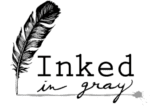For Your Entertainment is a a story by a punk music lover for a punk music lover. This YA contemporary story is full of references to the post-hardcore era of music we *ahem* old *ahem* millennials remember with affectionate nostalgia.
For Your Entertainment is a love letter to the adult generation’s misfit youth and the power of music, but what happens when music is not enough, when your “found family” is toxic, and when you feel betrayed by something so core to your values and identity.
We had the opportunity to interview Dane and learn more about For Your Entertainment! Sans spoilers of course 😉
What inspired you to write For Your Entertainment?
Without any spoilers, what was your favorite part of the book to write?
I don’t think it’s a spoiler to say that the book builds up to a sort of Battle of the Bands where Sammy’s band performs. When I write books, I always know how the book is going to end, but I don’t have all the details in mind. During the Variety Show, writing the performances were fun because the story started telling itself to me, making connections to other parts of the book, and naturally seeking a kind of resolution. There are three big performances, and each one took an immersive week to right because each performance needed to provide something to Sammy, to fix something, but all in a particular order. Is it cheesy to admit that, whenever I read those Variety Show chapters back, I get a little emotional?
Were there any major influences for you as a writer?
Without any spoilers, is there a character who holds a special place in your heart?
If your book had a soundtrack or theme song, what would it be?
What is your favorite trope?
What was a memorable moment for you when you learned language had power?
So what are you reading now? What’s on your TBR List?
What else have you written and where can we find them?
About Dane Erbach

Dane Erbach is a writer from Chicago’s northwest suburbs who teaches English and journalism at a public high school. His writing has appeared in a number of small online literary magazines, and his adult literary novel FRIDAY NIGHT AT HUMBLE HOUSE was published in 2024. When not writing or reading, you can find him catching Pokémon with his family, raiding his community library, and tending to the pumpkin patch in his backyard.
If you’d like to be notified when Cavendish House becomes available for sale or as an ARC read, sign up for our newsletter below!

